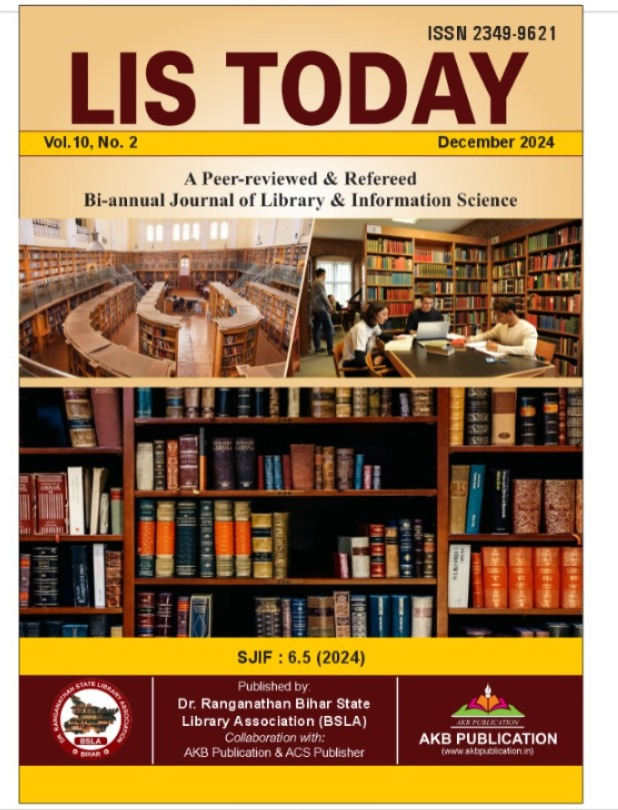Use of Smartphone in Retrieving Information among PG Students
Keywords:
Information, Information Retrieval, SmartphoneAbstract
We are living in technology era, everyone is using technological devices. Smartphone is also one of them. Smartphones are providing various applications like internet, e-mail, weather update, academic related various apps, short message device, video call facilities, current news, access document from anytime and anywhere and retrieval of information. The smartphone device is working as a multi functional device. The Smartphone is an information gadget for retrieving information for students. It can also easily portable device. In the other words today, smartphone works like a computer. We can say that smartphone is a combination of computer. This article related to my Master degree dissertation work.
References
[1]. (2018, December 28). Retrieved from Wikipedia: https://en.wikipedia.org/wiki/Controlled_vocabulary [2]. Abhishek, S. h. (2016). Adoption of sensor based communication for mobile marketing in India. 8(1), 65- 76. doi:doi/abs/10.1108/JIBR-08-2015-0091
[3]. Abhishek, S. H. (2016). Published by Emerald Group Publishing Limited. doi:doi/full/10.1108/JIBR-08- 2015-0091
[4]. Advantages and Disadvantages of having Smartphone. (2018, Feburary). Retrieved from https://www.eukhost.com/forums/forum/general/technology-forum/17752-10-advantages-and disadvantages-of-having-smartphone.
[5]. Ahmad, S. M. (n.d.). Scope and Impact of Android application in Education Sector. Chronicle of the Neville Wadia Institute of Management Studies & Research.
[6]. Ajay shankar Mishra, J. K. (2020, January 26). https://www.researchgate.net/publication/320016540_MOBILE_APP_AND_THE_LIBRARY_SERVICES. Retrieved from https://www.researchgate.net: https://www.researchgate.net/publication/320016540_MOBILE_APP_AND_THE_LIBRARY_SERVICES
[7]. Artifical Intellignece. (2018, June). Retrieved from http://what-when-how.com/artificial intelligence/artificial-intelligence-for-information-retrieval/
[8]. Bachchhav, K. P. (2016). Information Retrieval: search process, techniques and strategies. 2( 1).
[9]. Catharine, R. B. (2013). Educational use of smart phone technology: A survey of mobile phone application use by undergraduate university students. 47(4), 424-436. doi:doi/full/10.1108/PROG-01-2013-0003 [10]. Claudio Carpineto Stefano Mizzaro, G. R. (2009). Mobile Information Retrieval with Search ResultsClustering: Prototypes and Evaluations. 60(5), 877-895. doi:10.1002/asi.v60:5 [11]. Croft, M. S. (2012, May). The History of Information Retrieval Research. vol.100. [12]. Dorothy, O. (2015). Smart technology classroom in the stacks: promoting free government apps in academic library. 32(1). Retrieved from https://www.emeraldinsight.com/doi/full/10.1108/LHTN-10-2014- 0095
[13]. Fabio Crestani, S. M. (2017). Mobile Information Retrieval. Switzerland: Springer. [14]. Hasinul Elahi, S. I. (2014). Go Fast, Go with Mobile: Students perception on implementing mobile based library services at. Retrieved from https://digitalcommons.unl.edu/cgi/viewcontent.cgi?article=3117&context=libphilprac [15]. Here and Now: Reality-Based Information Retrieval. (2018, Feburary). Retrieved from https://imld.de/cnt/uploads/Bueschel-2018_RBIR.pdf.
[16]. Hiemstra, D. (2009, November). Information Retrieval Models. Retrieved from http://wwwhome.cs.utwente.nl/~hiemstra/papers/IRModelsTutorial-draft.pdf
[17]. History. (2018, January). Retrieved from https://en.wikipedia.org/wiki/Information_retrieval. [18]. Hong-Ren Chen, H.-L. H. (2010). User Acceptance of Mobile Knowledge Management Learning System: Design. 3(13), 70–77. Retrieved from https://pdfs.semanticscholar.org/d050/2b64a7083448c85971a256cf5004a037a7b8.pdf [19]. http://www.stmaryslibrary.org/collection-development-policy.html. (2018, March). Retrieved from http://www.stmaryslibrary.org/collection-development-policy.html.
[20]. https://www.researchgate.net/publication/215908576_collection_development_policy_in_electronic_era. (2018, March). Retrieved from https://www.researchgate.net/publication/215908576_collection_development_policy_in_electronic_era.
[21]. INFLIBNET. (2018, April). Retrieved from http://ir.inflibnet.ac.in:8080/ir/bitstream/1944/1153/1/74.pdf: http://ir.inflibnet.ac.in:8080/ir/bitstream/1944/1153/1/74.pdf
[22]. INFLIBNET, S. :. (2018, Feburary). http://shodhganga.inflibnet.ac.in/handle/10603/5661. Retrieved from http://shodhganga.inflibnet.ac.in.
[23]. Informationa Retrieval. (2018, Feburary). Retrieved from http://www.doc.ic.ac.uk/~nd/surprise_97/journal/vol4/hks/inf_ret.html.
[24]. International Journal of Next Generation Library and Technologies. (2018, May). Retrieved from International Journal of Next Generation Library and Technologies: http://www.ijnglt.com/files/Vol%202%20Issue%201/Kiran%20Prakash.pdf
[25]. Introduction to Samrt Phone. (2018, Feburary). Retrieved from https://www.telstra.com.au/content/dam/tcom/seniors/pdf/beginners-intro-smartphones.pdf. [26]. Iqbal, D. S. (n.d.). An efficient technique to retrieve information from a damaged near-field communication tag. Vol. 10(Issue: 1). doi:doi/full/10.1108/IJICC-08-2016-0028
[27]. Joel Cumming, A. M. (2010). The use of handheld mobile devices: their impact and implications for library services. 28(1), 22-40. doi:doi/full/10.1108/07378831011026670
[28]. Library Study and Information Technology. (2018, August). Retrieved from https://www.librarianshipstudies.com/2016/05/subject-indexing-process.html
[29]. Lusekelo Kibona, J. M. (2015, April). A Review on the Impact of Smartphones on Academic Performance of Students in HigherLearning Institutions in Tanzania. Vol. 2(Issue 4). Retrieved from https://pdfs.semanticscholar.org
[30]. Mansour, E. (2016). Use of smartphone apps among library and information science students at South Valley University, Egypt. Vol. 34(Issue: 3).
[31]. meaning, q. m. (2018, Feburary). http://www.mbaofficial.com/mba-courses/research-methodology/write-a note-on-the-questionnaire-method-followed-in-research-methodology/.
[32]. Meira Levy, P. S. (2010). Personalized Knowledge Service Based on Smart Cell-Phone Usage: A Conceptual Framework. Americas Conference on Information Systems.

